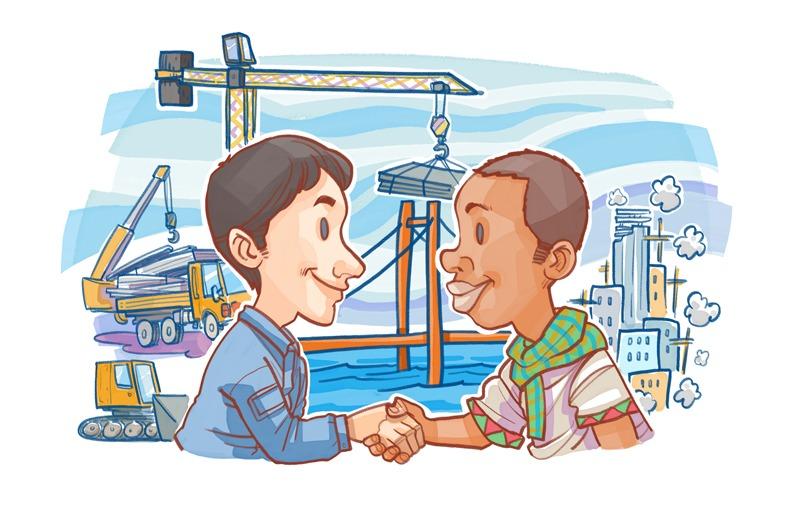 (CAI MENG / CHINA DAILY)
(CAI MENG / CHINA DAILY)
In 2020, while documenting the Abuja integrated transport project, which includes the metro, intercity railway and the Abuja airport, and is handled by China Civil Engineering Construction Corp, I read in detail how China developed its high-speed railways.
Cooperation between countries is important for improving infrastructure and boosting economic development, and it is cooperation that China is offering African countries through loans.
Yet, when some vested interests talk about China's loans to African countries, they don't mention that every international loan agreement is vetted by the International Monetary Fund for compliance with its Loan Viability Assessment obligations. Which means loan agreements between China and African countries, based on standing IMF rules, are not riddled with pitfalls that would push the latter into a debt trap.
Early this year, at an event to mark 50 years of Nigeria-China diplomatic relations, I asked Nigerian Foreign Minister Geoffrey Onyeama about the so-called Chinese debt trap. He said that before taking loans from China, Nigeria approached some other countries and agencies but almost always found Chinese creditors offering the best terms and conditions.
According to a document issued by Britain-based Jubilee Debt Campaign in October 2018, China's loans to African countries between 2000 and 2017 amounted to $143 billion. But the JDC explained that the actual loan liability of Africa according to the IMF and World Bank data are: China-US$100 billion (24 percent); Paris Club-US$40 billion (10 percent) World Bank-US$66 billion (16 percent); IMF-US$18 billion (4 percent); other multilateral institutions-US$61 billion (15 percent); the private sector (excluding China's private sector) US$132-billion (31 percent). That is a total of US$417 billion.
ALSO READ: Bangladesh shrugs off debt trap fear, lauds Chinese ODI
So if someone is laying a debt trap for African countries, it is not China but the West
According to the data, China is Africa's largest creditor country. But what about the other creditors? The Paris Club is made up of the US and major European economies apart from Japan, Australia and the Republic South Korea. And the World Bank, the IMF and the other multilateral institutions all belong to the West.
Therefore, the Western countries and their agencies are bigger creditors of Africa-to the tune of 76 percent. So if someone is laying a debt trap for African countries, it is not China but the West.
While some claim the volume of China's loans to African countries is huge, they ignore the fact that China has also been the largest investor in Africa over the past 12 years, which shows that apart from loans, Chinese investment in Africa is also benefiting African nations.
Yet Chinese investments in Africa are not comparable with the amount it has invested in Europe and Latin America. China's 5 percent foreign direct investment stock in Africa in 2017 was too low compared with what it had in European countries. Between 2016 and 2018, China's total FDI in African countries was 12 percent more than the combined figure for the European Union in Africa. Which proves China's interest in Africa is beyond loans.
In 2015 and 2016, China's FDI in Europe was about 64 percent of its total. But the 5 percent China brings to Africa is interpreted by the West as "slavery" and debt trap. Maybe, those spreading this propaganda want China to pull out of Africa. But since China refuses to do so, anti-China forces are using all sorts of distractions to blur the benefits created by China's loans to, and investments in, African countries.
And the US Institute of Peace admitted in 2018 that contrary to claims that the Chinese companies bring most of the workers for their projects in Africa from China, the ratio of Chinese to local African workers in Chinese-led projects is 1:20, heavily favoring the locals. This assessment was in relation to Nigeria's Abuja-Kaduna railway project, which I documented.
However, the possibility of China and some developed countries working in cooperation for the good of Africa is slim. First, because forging such a partnership between the two sides will take a long time. And second, China and the West have different foreign policies toward Africa, and harmonizing the two will not be easy.
The only possibility is through an intergovernmental agency or agencies. And the only known multilateral body that includes the developed economies is the G20, and I would not hazard a guess on the diplomatic likelihood of the G20 leaving aside its agenda, which is mainly about the benefits to the state parties, to discuss and implement pro-Africa projects.
READ MORE: Sri Lankan president: Port project not 'debt trap’
The author is editor-in-chief of the Africa China Economy Magazine, Lagos. The views don't necessarily reflect those of China Daily.


